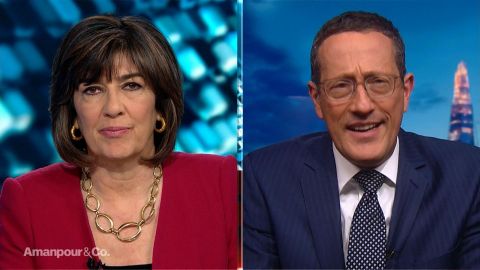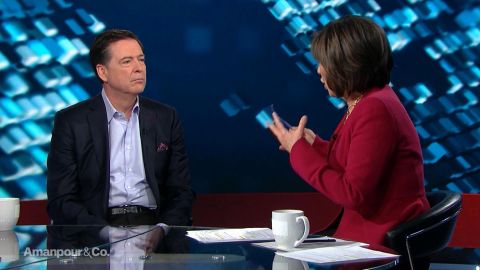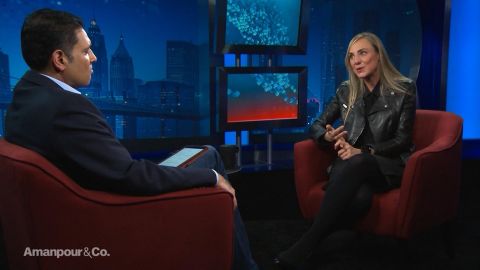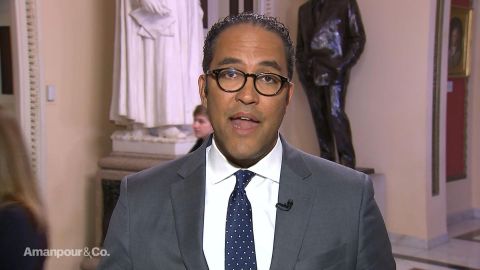Read Transcript EXPAND
CHRISTIANE AMANPOUR: You may not realize it, but the world’s fresh water is disappearing thanks to climate change and growing demand. Our next guest, Mina Guli, was a corporate lawyer in a former life, but she quit that job, founded the non-profit, Thrist, and took to the road, running marathons to raise awareness about our dwindling water that we drink. She managed to slow down for just a moment to speak to our Hari Sreenivasan.
HARI SREENIVASAN: You’ve worked as a lawyer, a banker, an investor. What made you want to pivot toward water?
MINA GULI, FOUNDER AND CEO, “THIRST”: Water is the most fundamental thing that our societies and our economies and our communities rely on for life. If we have no water, we have no way of life. When I discovered how not only important water is for our communities and our economies but how fast we’re running out of usable water. I couldn’t believe that it wasn’t higher on the list of topics to talk about. I couldn’t understand why it wasn’t the number one thing that newspapers and media outlets were focusing. And so, I set about trying to change that.
SREENIVASAN: What are the longer term impacts to countries and communities when water becomes more scarce?
GULI: So here’s the thing about water. We all think that water is going to be someone’s problem. If we live in a big city and water comes out of the tap, we think, “It’s not going to affect us.” The reality is when it starts to affect supply chains, when it starts to affect lives and livelihoods it’s our problem too, because we have to understand. Every time we take a piece of food off – out of the fridge or off the shelf, that’s water that we’re taking that came from somewhere. 78 percent of jobs, 78 percent of jobs are linked to water. So if you have no water, jobs will be lost and economies will suffer. And it’s not something that’s going to happen many years from now; it’s something that’s happening right now. I’ve run through these cities. I’ve seen it for myself. I’ve spoken to these people. This is a problem that’s real; it’s getting worse, and it’s – it’s happening right now.
SREENIVASAN: So let’s connect the dots here. How does the thirst for water connect to running in deserts and along river banks?
GULI: The thing about the water crisis is that it’s about supply and demand for water. So experts predict that there’ll be a 40 percent greater demand for water than the supply of water available by 2030. That’s 11 years from now.
SREENIVASAN: So we’re going to need that much more water than we have?
GULI: Yes, that’s right. So even though we – it seems like we’re surrounded by water all across our planet. Less than one percent of it is available to us to use. And the problem with that one percent is not only are we demanding more, but we’re also — we’ve also got less and less available to us. Because pollution, groundwater pollution, because climate change is causing changes in weather patterns so rainfall is falling in places that we can’t catch it or that gets polluted in a flood and gets washed out to sea. This supply-demand piece is absolutely key. So there are lots of people focused on the supply side, figuring out how we can desalinate water more efficiently, figuring out how can clean water, how we can deliver more clean water to more people, but there’s very few people focused on this demand side. And the thing that really interests me about the water crisis is how each one of us are not only affected by the problem but can become part of the solution.
So I decided that I was going to run, use my feet to run around the world in some of the places most badly affected by the water crisis to make people who were suffering from water scarcity or lack of clean water or lack of sanitation and hygiene services, to tell their story and to also meet the solution providers, people who are working to solve the crisis. So I started running. And that’s how running and education and Thirst all kind of came together.
SREENIVASAN: So you’re not a runner by nature.
GULI: Oh, no I’m definitely not a runner.
SREENIVASAN: I mean, you kind of are one now because you have to be. I mean, you’re — you’ve run or you’re in the process of running 100 marathons, right? In, what? 100 days?
GULI: Yes. When you say that it makes me sound completely crazy. OK, so —
SREENIVASAN: You can’t say you’re not a runner and then say, yes, well I am kind of running 100 marathons.
GULI: Yes, but I don’t run because I like to run or because I’m good at it or naturally talented, because none of those things are true. I learned to run because it’s a way for me to go with my feet to these places and meet people and tell their stories. This is not a story about me, it’s a story about humanity.
SREENIVASAN: You’ve run in some amazing and exotic places. What are the – – what are the kind of stories that stick in your mind of how this really large abstract problem is a personal crisis for people on a daily basis?
GULI: One of the places I ran in the first half of my marathons was to a place called Beaufort West. It’s about four hours drive north of Cape Town. And in Beaufort West, the people in the community have literally run out of water. They turn on the taps and no water comes out. And they rely on bottles of water that are delivered to them daily on the back of a truck. And in one of my marathons I joined the people and the women on the back of this truck and I took water to the local communities.
We had people running after the truck, begging for more water. We drove along the street and instead of turning left, we turned right and a fight broke out on the street because the people that we didn’t deliver water to at that moment were thirsty and they needed water to drink to live. I thought to myself, this is really dire consequences, but it paints it into a really real light. In South Africa where communities there they’ve had so little water that there are for sale signs littering the streets. I met a guy called Christian who’s a 24-year-old farmer and he showed me pictures of his farm, lush and green, he showed me pictures of his dam which had nine meters of water in it less than 12 months beforehand.
And half an hour later, I ran across that dam. That dam is so — is dry as a bone. There is not a drop of water in it. And I said to Christian, what is your hope for the future? Remember, he’s 24 years old at a time when dreams and ambitions should be everything to him. And he said all I do everyday is hope for rain because if it doesn’t rain, I have to leave my farm and the farm will be valueless, I will have nothing.
SREENIVASAN: And it’s not just developing countries. I mean, we should point out that the United States per capita, we probably consume more water than the average Chinese or Indian citizen, right?
GULI: Yes. Yes, you do. It’s funny because people will say to me sometimes, oh, can you come in and teach the migrant school or a very poor community and I say yes, but the people that know most about water are those people because a lot of them don’t even have access to it, so they understand the value of every drop. One of the groups of people we really need to change are those that have everything. Because they don’t understand that they have everything, but one day they’re going to have nothing.
SREENIVASAN: You ran n across the United States as well. What did you learn here?
GULI: When I went to California I met farmers in the Imperial Valley and I heard from them they’ve gone through this massive period of drought. The drought has become so bad that there are communities who’ve been asked to remove 50-year-old trees from orange groves — not just one or two but 70 percent of their crop — because the local communities think that they’re using too much water. You can see sinkholes opening up in California, you can see the impact that drought is having on farmers, but also on economies as house prices fall, property prices get devalued, people literally don’t have access to water. It’s challenging. On the other side, this is not all doom and gloom, so El Paso which is a city that sits right on the border has access to the Rio Grande which runs straight through it between Juarez and El Paso.
Every day people in El Paso communicate directly with the guys in Juarez to work out how they’re going to share the water coming out of the Rio Grande. They do it frequently, they do it happily and they do it in a very collaborative way. And it seemed to me that one of those examples of just we don’t think about how water is critical to our lives every day. We also don’t realize how it ignored boundaries, it ignored history, it ignores everything. Water just is or it isn’t.
SREENIVASAN: I’m imagining when you don’t have something as basic as water, you get up and move, you leave if you can, right?
GULI: Right, which is what’s happening in the displacement of millions and millions of people across the planet who at the moment it’s in places like Sudan and Somalia in the Middle East where we see – and Syria where we see people who have no access to water to grow crops to feed their – to feed the cattle that they rely on or the sheep or goats. And when they have no option but to move in order to be able to drink water and give food to their families, they move. And they’re – right now there is displacement of people. So this is going to get worse, there will be refugee crisis because people have no option but to search for survival.
SREENIVASAN: How did you choose one marathon place over another?
GULI: When I started, I created a little filter system which was it needs to have either a water problem or a water solution. On the water problem side, I have to tell you there are so many countries and cities and places with water challenges, so Iran (ph) and everywhere from the U.K. and we told a story about food waste. Most people don’t think about the fact that when you waste food you waste water. I met women and children on the edge of the port in Uzbekistan, and we talked about how the fact that the inland ocean has retreated has caused massive problems for their economy and their society.
Fishermen can no longer fish, but the people who used to make things in this town of Mo’noq can no longer put those things onto a boat to ship it across to Kazakhstan and get access to markets internationally. So they suddenly have become much more isolated, which means that they’ve lost jobs, women came to me begging me to help them to get some money so they could send their kids to school. I mean it’s just – these things are scary and horrifying and extremely confronting, but it’s their stories that I wanted to be able to tell.
SREENIVASAN: Sixty-two marathons in, which I think for most people on the planet would already be an accomplishment, but what happened on marathon 62, or day 62?
GULI: When I got to day number 62, got to the end of the marathon and I couldn’t take another step. I couldn’t even get into the car, though my team had to help me get into the car, they had to help me get out of the car, and on day 63, when I got up ready to run a marathon my team said if you can’t walk across the room unaided, we’re going to the hospital. Of course I couldn’t, I mean I couldn’t even put my foot down on the ground by this stage. So we went to the hospital, we did a scan and discovered that I had not just a little break, but an absolutely massive break in my leg.
And all I could do was sit there and watch the clock thinking how can I get out there and do my run? And I watched as more and more doctors came and more and more people came and told me I wasn’t going to be able to get out there. And I thought my whole word was collapsing around me, everything I could see was dark, bleak. I felt that I had let down my team, all the people who’s messages I wanted to tell, the stories that I wanted to push to the world, and most of all I felt that I had let down the cause that I was so committed to.
And my team sat down – they’re some of the best people in the world, and they sat down and they said Mina, we’ll take your runs for you today. Today we’ll go and we’ll run your marathon. And I sat in my wheelchair and I watched as they did just that. The next day they went out and ran again, but this time they were joined by people I didn’t know. The day after, more people joined. By the time we got to marathon number 65 and 66 and 67, people were joining from all across the world.
SREENIVASAN: So they were just running their own marathons.
GULI: Yes, running their own distance and donating it so that I didn’t have to run. By the time we got to day 100, we had thousands of people in over 160 cities, in over 50 countries and territories on every single continent of this planet, all running and donating their distance to support one cause, and that’s water.
SREENIVASAN: You stared this 100 in New York City at the New York City Marathon.
GULI: Yes.
SREENIVASAN: You finished 100 here in New York as well. And in the 100th one you were being pushed in a wheelchair.
GULI: Yes, I was.
SREENIVASAN: And, I mean, you don’t know this. You came and you’re sitting here, but you’re still using crutches, you’re still on the road to recovery, right?
GULI: Yes.
SREENIVASAN: So, what was it like then?
GULI: When I crossed that finishing line it was a mixed bag of emotions to be honest. I felt humbled by the community of people that had come around me. Humbled, particularly, because I was not able to complete this on my own, that I needed the steam and the power of people, that I’ve always said, the power of the people are what puts wind beneath my sails when I’m running, but this gave a whole new meaning to that because it wasn’t just the wind beneath my sails, it was the power behind my wheelchair, it was the community of people that helped me to do things when I was on crutches, and I still am.
But every time, when I think I can’t get up, every time I think I can’t take another step, I think about the next generation, I think about the kids. I want to have a planet where kids can grow up and do whatever they want to do, fulfill their dreams, unfettered by water scarcity. And I wont’ stop until that happens.
SREENIVASAN: All right, good luck getting back on the road. Mina Guli, thanks so much for joining us.
GULI: Thank you.
About This Episode EXPAND
Chrisitane Amanpour speaks with James Comey and Will Hurd. Hari Sreenivasan speaks with Mina Guli.
LEARN MORE



